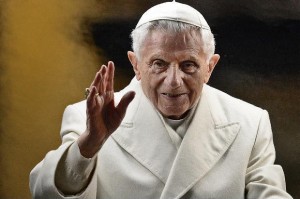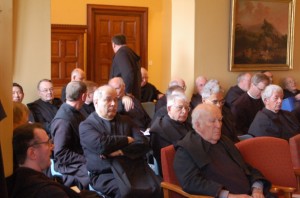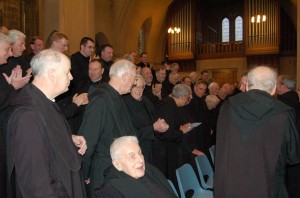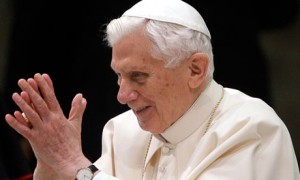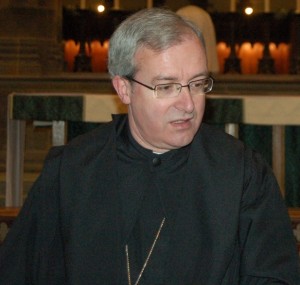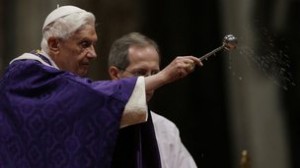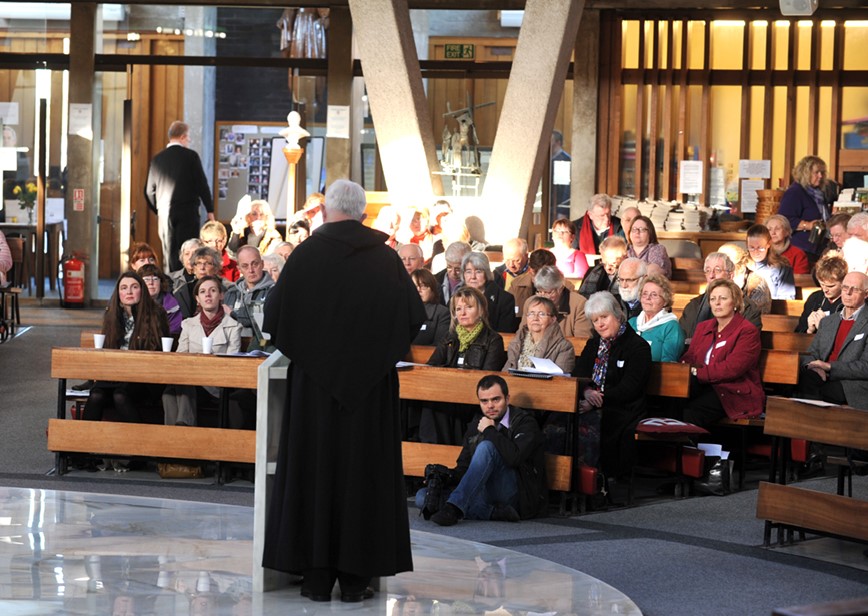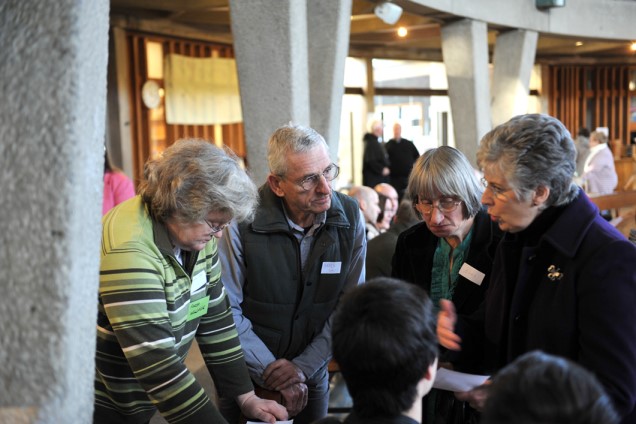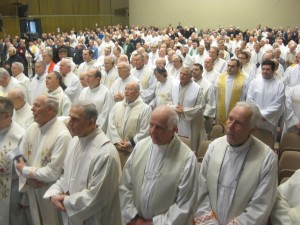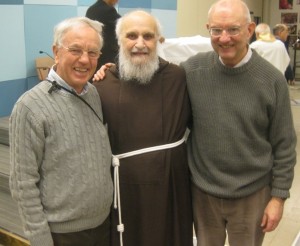The resignation of Pope Benedict XVI has stirred up much thought in those who can see the importance of the event. People who are indifferent to the Catholic Church like many British people, or those in our country hostile to the Church would probably not be bothered and that is perfectly understandable.
Like other Catholics and Christians of other Churches, I have found myself deeply interested in what is going on. At first I doubted the truth of the announcement, then felt sad and sorrowful, confused at what may happen, and uncertain about the future. Later I realised the greatness of Pope Benedict and his response a disciple of Christ. The expressions of sorrow at the departure of Pope Benedict come from all over the world, and I suspect from the humblest Catholic to the most influential dignitaries in the Church.
When Pope John Paul 2 wrote his famous encyclical in 1995 Ut Unum Sint (May they all be One), he asked for all the Churches to join in with the Catholic Church to reflect on the role of the Papacy for all the Christian Churches. Pope John Paul 2 acknowledged that the papacy itself was an obstacle to Christian Unity because of the whole story of the divisions within Christianity.
The theological issues are discussed in learned papers by learned people. The one issue that comes to my mind is the fact that there is increasing interest in the Papal Office in recent times. This in itself may be part of the issue. It is said that one in three of all human beings spent some time watching the funeral of Pope John Paul 2 in 2005. It is also said that those attending Papal audiences have simply increased and increased, and we from the Parish certainly experienced the much longer queues and many more people the last time we were there with a Parish Pilgrimage about five years ago.
Some people may see this huge desire to see the Pope as completely out of proportion. The office of the Papacy is given a kind of “god-like quality” that they may feel is wrong.
Now for the first time in 600 years a Pope had decided to resign. This might begin to throw all the “exaggeration” (if it is exaggeration) about the Papacy into confusion. The fact is that we Catholic Christians say the Papacy is the centre of unity of our Church. To be a Catholic means being in communion with the Pope and this happens through the Bishops of each diocese who are themselves in communion with the Pope. Is it this truth that leads to the millions of people each year wanting to visit Rome and see the Pope? He is the one who guarantees the fidelity to the Apostolic tradition alongside the Bishops of the Church who are united with him. In the end communion with the Pope is not complex; however in practice unity is not always easy to maintain with both Pope and the Bishops. We need to be in communion with both.
If we ask what in our confusing and rapidly changing world lasts for ever, the answer would be the Word of God. “The grass withers, the flower fades, but the word of our God will stand forever” (Is 40: 8) Interestingly the Pope and the Curia are having a retreat this week from Cardinal Ravisi, and he speaks in what might seem the opposite sense, of the fragility of the Word : (“The Word) is extremely fragile – because once said, it passes away – but at the same time it has a particular efficacy, because communication would not exist without the Word.” The Word of God is not just words spoken or read (even from the Bible) but we know the Word of God is a person, Jesus himself. The Word became flesh and dwelt amongst us, and He died and rose again and is still with us. “I am with you till the end of time.”( Mt 28: 20) The challenge for us is truly to know and have a relationship with Jesus. In other words it is God who remains for ever and He is Love.
In the light of all this I would like to put into this blog the 20 frequently asked questions that have been answered by Fr. Lombardi, director of the Vatican Press Office. The questions are very relevant and the answers are clear and concise.
In the meantime may we all pray for Pope Benedict XVI and for those responsible for the election of the next Pope.
Some interesting Questions and Answers
about Pope Benedict XVI’s resignation
Benedict XVI’s renunciation has raised many questions, and not only in the Catholic world. Some of the questions are of a practical nature, while others regard more far-reaching doubts.
Jesuit Father Federico Lombardi, director of the Vatican press office, has given several press conferences since the Pope announced his resignation February 11th.
During the briefings, journalists have asked questions to which Father Lombardi gave answers with the information available at the time. Following is a quick and brief selection of 20 of these questions and answers, in summary form. They are not word-for-word quotes of Father Lombardi, but rather a synopsis of his responses.
Pope Benedict on February 16th 2013
1.What will be Benedict XVI’s last public appearance as Pope?
A: Benedict XVI’s last public appearance as Pope will be the General Audience on February 27, 2013, in Saint Peter’s Square. Exceptionally, the general audience will include a liturgy of the Word and moments of prayer. The next day, Thursday the 28th, there will be a private audience in the Clementine Hall of the Holy See with some cardinals. This will be the last audience of his pontificate.
2. Does Benedict XVI have some serious illness in particular?
A: No, Benedict XVI does not have a serious illness in particular.
3. Is it true that Benedict XVI has a pacemaker?
A: Yes, it is true that Benedict XVI has a pacemaker. He has had it since he was cardinal prefect of the Congregation for the Doctrine of the Faith. A few weeks ago the batteries of his pacemaker were changed.
4. Will the encyclical on faith be published that Benedict XVI has been writing?
A. No, there is no plan to publish the encyclical, as Benedict XVI was unable to finish it. Eventually, if he decides to publish it, it will not be ranked as an “encyclical.”
5. Why did Benedict XVI choose 8:00 pm on February 28 to end his ministry as Pope?
A: Because it is the time in which he usually ends his work day.
6. Where will Benedict XVI live after he retires as Pope?
A: Initially, for a period of two months, in the papal residence of Castel Gandolfo. Afterward he will return to the Vatican to live in the Mater Ecclesiae cloistered convent.
7. Is it true that Benedict XVI decided to resign during his apostolic journey to Mexico?
A: During his apostolic journey to Mexico and Cuba, Benedict XVI matured in the matter of his resignation as one more stage in his long process of reflection and discernment on this subject. However, the trip had no other particular relevance in this regard.
8. What will Benedict XVI’s name and title be after February 28?
A: It is a matter that is still being reflected upon. There is a certain unanimity that he should keep the name Benedict XVI and that his title should be “Bishop Emeritus of Rome.” In the Pontifical Yearbook Benedict XVI will continue to be the official name used.
9. Will Benedict XVI take part in the Conclave to elect his successor?
A: No, Benedict XVI will not take part in the Conclave to elect his successor and he will not be part of the College of Cardinals.
10. How will Benedict XVI dress after February 28?
A: It is not yet known how Benedict XVI will dress after February 28.
11. Is provision made in the Church for a Pope’s renunciation?
A: Yes, a Pope’s resignation is provided for and regulated by the Code of Canon Law.
12. What will happen to Archbishop Georg Gänswein, Benedict XVI’s private secretary and prefect of the Papal Household over the last few months?
A: Archbishop Georg Gänswein will continue to be Benedict XVI’s private secretary. He will accompany him to Castel Gandolfo (and later to the Mater Ecclesiae convent), and he will also continue to be prefect of the Papal Household. Similarly, it is possible that his second private secretary will go to Castel Gandolfo and accompany Benedict XVI for a time.
13. Who will live with Benedict XVI in the Mater Ecclesiae convent inside the Vatican after his retirement?
A: The Memores Domini (a group of consecrated women, who help the Pope in the ordinary needs of a home), and his private secretary, Archbishop Georg Gänswein, will live with and assist Benedict XVI after his retirement.
14. Did the subject of the so-called Vatileaks scandal influence the Pope’s decision?
A: It had no relevance. If one wants to receive correct information, one must limit oneself to what the Pope has said about his renunciation.
15. When, approximately, will the conclave begin?
A: The most likely dates are that it will begin between March 15-20 2013.
16. Did Benedict XVI change the norms for the election of a Pope in the last weeks?
A: No, Benedict XVI did not change recently the norms for the election of a Pope. He made a small change in 2007 to modify the system of voting. The modification of 2007 establishes that a two-thirds majority will always be necessary in the voting carried out in the Conclave. However, the rest of the norms in force continue to be those of the Apostolic Constitution Universi Dominici Gregis.
17. Are there power struggles in the Vatican?
A: In all institutions there is a dynamic that leads to different opinions, which is always good. The difference and diversity of opinions are positive if they lead to the good of the institution itself. However, such differences should not be given too much weight as they would not correspond to the reality or to persons’ intentions. To say that there are power struggles does not correspond to the reality of what is happening in the Church at this time.
18. Did journalist Peter Seewald interview Benedict XVI before his renunciation?
A: German journalist Peter Seewald, who has interviewed Joseph Ratzinger-Benedict XVI several times in the past, interviewed Benedict XVI two and a half months ago. The interview is to be included in Benedict XVI’s official biography, on which Seewald is working.
19. Will Benedict XVI meet with the new Pope?
A: There is no plan for Benedict XVI to meet with the new Pope.
20. Why has Benedict XVI decided to stay in a convent in the Vatican, after his two months at Castel Gandolfo, and not return to his native Bavaria?
Although Benedict XVI has not explained it clearly, his presence and prayer in the Vatican gives spiritual continuity to the papacy. Moreover, Benedict XVI has been living in the Vatican for more than three decades.
